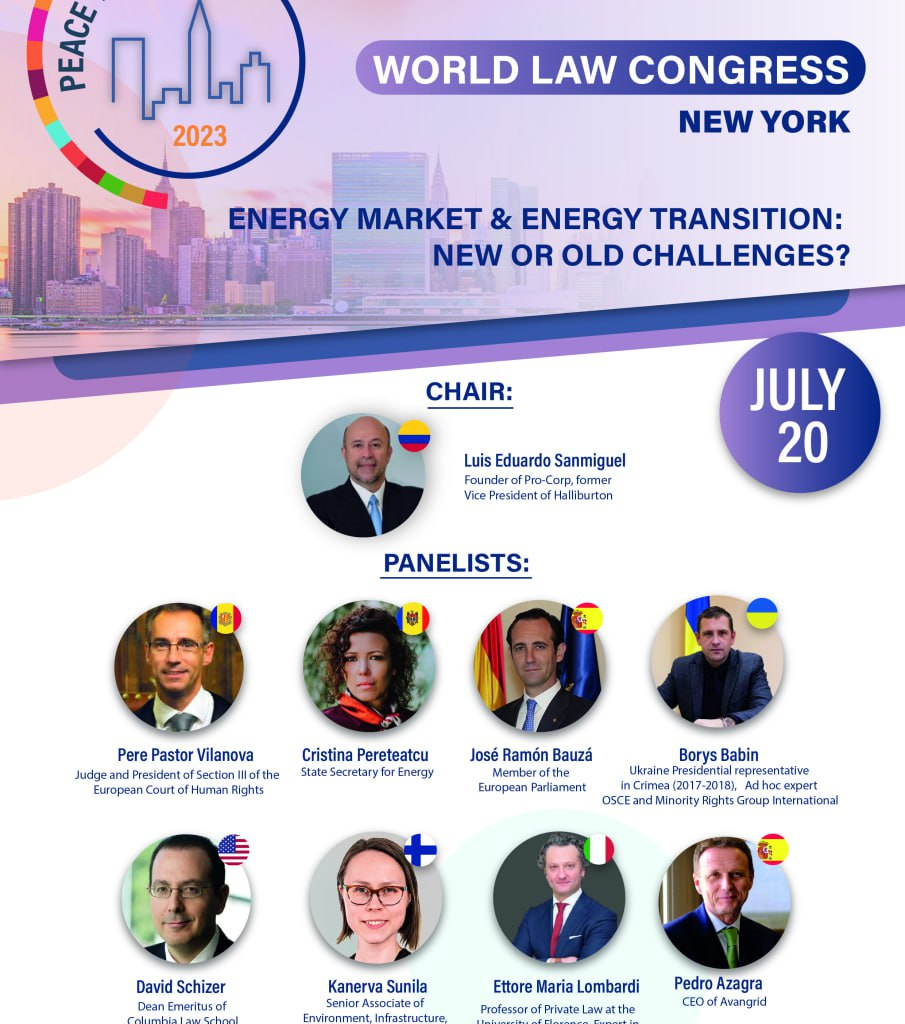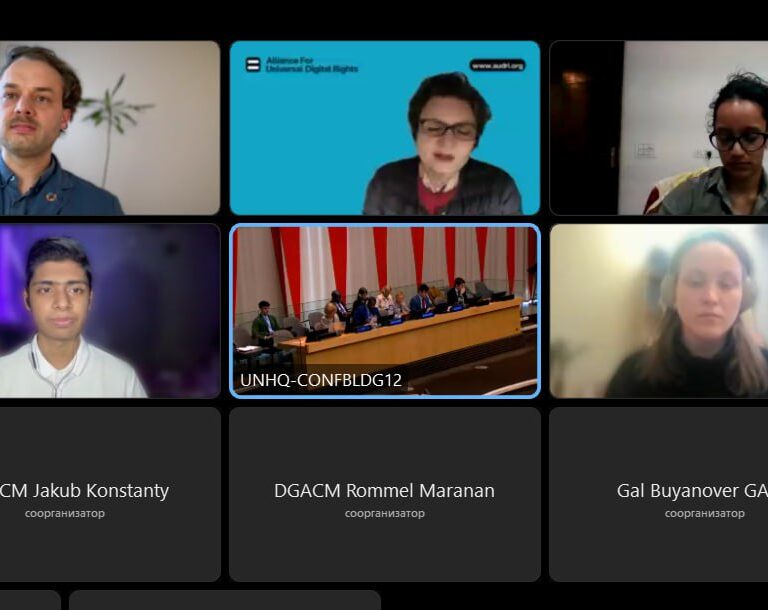On July 20, upon invitation of World Jurist Association, a structure with special consultative status to the United Nations, our Association’s expert, professor Borys Babin, took part as a speaker and panelist in World Law Congress organized in New York in UN Headquarters.
During the Congress, more than 2,000 worldwide legal area leaders gathered to discuss current matters that the legal world should address, including head of states, President of the European Commission and Vice President of the International Criminal Court. Professor Babin reported online on Panel 4 of Congress “Energy Market and Energy Transition: New or Old Challenges” on topic of legal challenges for energetic in wartime conditions.
Dr. Babin stressed that conflicts on energy markets and sourses often were and are the ground of global and regional interstate conflicts and the international law is still not a full page guidebook for those issues.
The demands of law of peace regarding energy are concentrated in areas of nuclear industry, international usage of rivers for hydroenergetic, submarine pipelines, maritime oil transport limitations and carbon dioxide emissions; also the lex mercatoria regulates the international trade on electricity and energetic sources.
But demands of law of war are quite other and not too simple, including the “grey zone” for states who are not belligerents but also are not neutral ones.
First example, added professor Babin, is sanctions and its realization in energy sector may be researched on example of Russian aggression against Ukraine. Exactly this non-provoked war caused limitations against Russian oil and gas industry and trade but also it started the discussion of lawful targets for military attacks.
Now Russia-controlled trade vessels transport oil in Black, Baltic and Mediterranean seas often non in compliance of sanctional demands and situation of its possible detentions by port authorities or by naval force will definitely cause some legal proceedings.
But except events in such “grey zones” direct negative impact of military activities may be evaluated via international humanitarian and international criminal law, exactly for conflict zone and as it may be traced for nuclear, thermal and hydroenergetic, expert stressed.
Dr. Babin reminded that Ukraine’s thermal power plants become a specific target of Russian missile attacks in Ukraine since Autumn 2022 and some of them were totally or partially destroyed as Russian aggression’s goal was to make total blackout for Ukrainian energetic.
Such tool of war was determined as totally illegal in set of resolutions adopted by bodies of UN, OSCE, Council of Europe and other structures and in future the orders of International Criminal Court are expected to be issued for organizers and executors of such attacks.
Ukraine’s Zaporizhzhya nuclear power plant was captured by Russian occupying forces in March 2022 and in that time Russian troops tried to take under control South Ukraine nuclear power plant but without success.
Last year Zaporizhzhya power plant was permanent tool of aggressor’s provocations and its non precedent example proved weakness of International Atomic Energy Agency; any conventional proceeding is not still started on this issue but in future the question arises for possible responsibility, including material one, and not only for Russian state that declared illegal attempted annexation of Zaporizhzhya region of Ukraine but for Agency itself.
But, Dr. Babin added, the worst and most broad-scale negative result was in destruction of Kakhovka Hydroelectric Station, committed by Russian troops in June 2023 but not so in framework of energetic, but regarding ecologic, navigation and humanitarian disaster, caused by flooding in Kherson region and by collapse of inter-regional melioration systems, connected with Kakhovka Reservoir.
As on issue of Russian missile attacks against thermal power plants, destruction of Kakhovka station caused adoption of international resolutions and it may be reflected in future in the activities of International Criminal Court, and it may possibly activate the discussion regarding international ecocide criminalization.
Also the issue of green energy must be pointed and relevant challenges connected with Russian aggression in Ukraine started long before 2022, exactly from beginning of occupation of the Crimea, where solar and wind power stations were located, exert stressed.
Illegal so-called “nationalization” of Crimea-located wind power stations was organized in 2014 by so-called “authorities” and, as result, some individual proceeding were started before the European Court of Human Rights from stations’ owners and its top management representatives.
Russian illegal “authorities” declared fake “nationalization” of Crimea-located solar power stations after broad-scale invasion in 2022 and this process may have possible goal in hiding real beneficiaries of such stations, Dr. Babin pointed.
In common, issues of power stations’ and energy networks’ real beneficiaries became essential in Ukraine after Russian aggression started, and the example of Ukrainian oligarchs and their machinations with “Kyivenergo”, also as example of Russian oligarch Babakov’s clan and their scam with “Khersonoblenergo” and “Sevastopolenero” may be noticed, Dr. Babin reminded.
Exert stressed that our Association started researches on issues of energy market and transition during post conflict period in Ukraine and our results will be soon presented.
Also Dr. Babin sent, upon the request of interested Congress organizers, special video with report on urgent issues of maritime security.
Dr. Babin reported on Association activities in framework of IMO resolution C/ES.35 sending regular information to authorized international bodies on current challenges, connected with Russian maritime aggression and demanding to stop Russia’s participation in IMO, ILO and FAO.
Also expert informed Congress participants on issues of termination the Agreement on Cooperation in Use of Sea of Azov and Kerch Strait, 2003 and Agreement on Fisheries in the Sea of Azov, 1993 where in case 420/8381/20, the Ukrainian Supreme Court in 2023 established the need to investigate inaction of authorities to not terminate that bilateral fishery agreement in 2014-2022.
Dr. Babin pointed on Russian next provocations, illegally declaring Sea of Azov as its alleged “internal one” and disseminating false navigation maps and described Russia’s provocations against safety of shipping, connected with illegal “federal state unitary enterprise” “NIKIMS” that “operates” by Russia-controlled “Kerch Ferry Lane”.
Also expert described consequences of Russia’s provocative termination in July 2023 the agreement, signed year ago in Istanbul with Turkey and the United Nations to unblock Ukraine’s Black Sea grain exports after a Russian blockade raised fears of a global food crisis.








